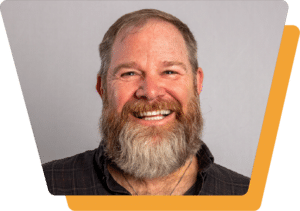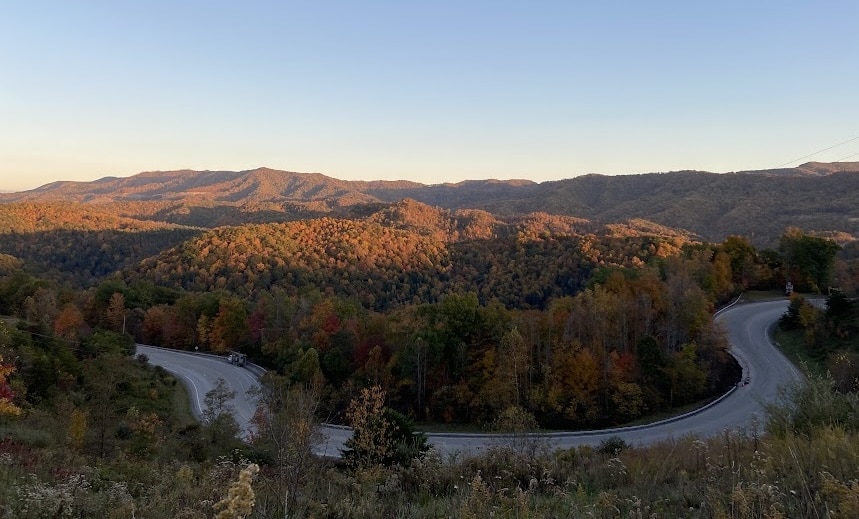When Columbia-Greene Community College (C-GCC) became part of the ATD Network in 2021, it was on a mission: The college joined as part of the inaugural Building Resiliency in Rural Communities for the Future of Work initiative, a project that aims to connect students at rural institutions with careers in the digital economy that offer family-sustaining wages.
Located in Hudson, NY, C-GCC has a student body of about 2,000, most of whom are part-time learners (according to IPEDS data from 2022). The college serves the counties of Columbia and Greene, which together span about 1,300 square miles — the geographic size of Rhode Island.
Matthew Kenny, a professor of biological sciences, is one of the core team leads working on the initiative. His 23-year tenure at C-GCC, personal history, and self-described “gift of gab” equipped him for a community outreach project that would have a powerful impact on the college’s student success efforts. He spoke with ATD about the work his team has been doing to advance workforce partnerships, including his hands-on approach to connect with regional employers.
“I was speaking to front-line people. And I think I got a really honest conversation from them about their workforce and their knowledge of the college.”
—
Matthew Kenny
Professor of Biological Sciences,
Columbia-Greene Community College
Making connections
As Matthew and the other members of the Rural Resiliency Cohort team began setting priorities and outlining their objectives, they asked each other essential questions: What are the digital workforce requirements in a rural setting? What skills or credentials should students leave the college with to become successful employees?
Matthew recognized that the region’s employers had the answers they were looking for. “And finally, I just said, why don’t I just go ask?”
He pitched his idea to the C-GCC President Carlee Drummer: He would spend the summer of 2022 talking directly to employers and business owners in Columbia and Greene Counties, asking questions that would help his team make more informed decisions to support their students. He collaborated with Amanda Karch, director of the Community Engagement Office, and Andrew Ledoux, dean of student development, to create a questionnaire for local businesses aimed at helping college leadership better understand the needs of the local workforce.
To start, Matthew spent three days cold calling businesses over the phone, “and not a single employer called me back.” So he got in his car and started knocking on doors.
The in-person approach paid off. Matthew had productive conversations at businesses around both counties, often talking to staff members whose perspectives the college might never have heard.
“What was really interesting about this approach of cold calling … was that I was speaking to front-line people,” Matthew said. “And I think I got a really honest conversation from them about their workforce and their knowledge of the college.”
He ended up connecting with 37 employers across the college’s service area, in industries from retail to manufacturing to agriculture
The question that changed everything
One of Matthew’s most meaningful conversations took place at a popular fast food chain, where he spoke with a floor manager. “She was brilliant and bright and just a light,” he recalled.
At some point during their conversation, Matthew asked the floor manager if everyone on staff had a high school equivalency (or GED). She estimated that most new hires, and perhaps 30 percent of their total workforce, didn’t have a high school diploma or GED.
“That very much shocked me,” Matthew said.
As they began discussing how the college could help address this need in the local workforce, the floor manager quietly admitted that she herself didn’t have a GED. Matthew said the moment had a profound effect on him, and he walked away saddened by the ways the education system had failed this young woman.
“It became abundantly clear to me that this is just not okay.”
—
Having a high school diploma or equivalent credential is critical to workers’ upward mobility. Without one, “they’ll hire you, but they won’t promote you,” Matthew explained. “So you’re going into a workforce with an imposed ceiling, where your pay isn’t going to come close to a living wage.”
He immediately started working with the non-credit department to learn more about C-GCC’s existing offerings and to see how they could better serve their community. He learned that there was no GED testing site within a 50-mile radius of the college. Which meant learners attempting to gain a high school equivalency, many of whom are limited in resources or can’t take time off work, have to travel an hour or longer to demonstrate their knowledge.
“It’s insensitive, it’s unkind, and in many cases insurmountable,” Matthew said. “Especially if you don’t offer a funding source to help some of the individuals who need it most. It became abundantly clear to me that this is just not okay.”
The Workforce New York office housed on campus had applied to make the college a GED testing center, but the process had stalled. “I’m a bit of a bull in a china shop,” Matthew joked, and he aggressively set out to understand the criteria for qualifying as a testing center and prepare the college to meet those criteria.
As of May 2023, the college is officially an approved testing site, and operations will soon be up and running. Matthew said he was excited to return to the 37 employers he spoke to and share materials that explain how Columbia-Greene can be a strong partner to elevate their employees’ potential.
In particular, he hopes to speak to the young woman who inspired this project. “I can’t wait to go back to her and say, ‘This is what you did, and here is how we can move your needle forward.’”
“We have expanded the relationship with our partners in a more holistic way that wouldn’t have happened without these critical conversations, without asking what we can bring each other.”
—
Strong relationships for stronger supports
Leaders at C-GCC have been hard at work in many other areas to partner with organizations in the community and strengthen opportunities for students.
Early on, the Rural Resiliency team organized a retreat with four of the college’s workforce partners: Columbia Memorial Health, the community’s regional hospital; Ferguson Distribution, the Workforce New York office on campus; and The Olana Partnership, a local arts organization connected to the state park system. In a casual setting, the college and visiting organizations discussed the value they all derived from working together, but also identified a need shared among all four partners: leadership training. While unemployment in the region is low, employers often struggle to develop entry-level employees into good supervisors.
Based on that conversation, the Workforce New York office funded a free “Supervisory Basics” training class for employers in the region — the course became so popular that the college had to open a second one.
The college has also expanded its partnership with the community hospital, focusing not only on healthcare jobs but also on business and administrative jobs, non-medical roles that keep the hospital running. “We have expanded the relationship with our partners in a more holistic way that wouldn’t have happened without these critical conversations, without asking what we can bring each other,” Matthew said.
He credits the college’s work with ATD as a significant contributor to their recent successes. The tailored support “allowed us a series of steps to be really critical,” he said. ATD’s coaches have guided faculty and staff with strategic questions to define goals and have supported the college in gathering data and taking steps to achieve those goals. He also said there has been significant buy-in from faculty across campus, with instructors willing to change their processes to meet their students’ and their community’s needs.
But among all of the projects his team has undertaken, Matthew has the strongest connection to their GED work. He discussed his own history as a first-generation community college student. “I understand what it’s like when you don’t know how you’re going to pay rent, what it’s like to work two jobs,” he said. As he was touring the region’s businesses, he saw himself in the employees, and he understood on a personal level how much difference the college could make in their lives.
“We can do so much by just saying, ‘This is how you take your first step forward.’ And that, to me, is how you create some profound change.”
Building Resiliency in Rural Communities for the Future of Work aims to increase equitable student success by strengthening the capacity of rural colleges to prepare students for careers in today and tomorrow’s digital economy. Learn more


